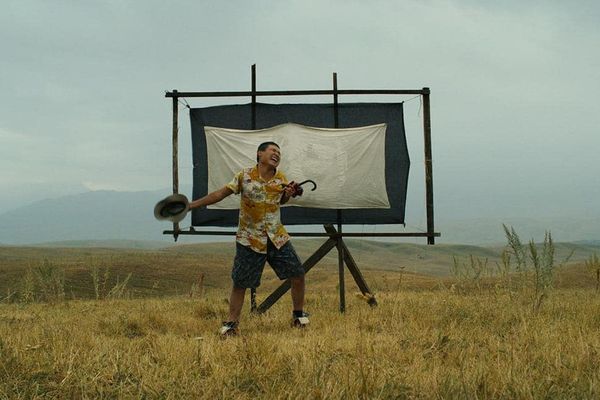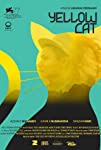Eye For Film >> Movies >> Yellow Cat (2020) Film Review
Yellow Cat
Reviewed by: Amber Wilkinson

Prolific Kazakhstani director Adilkhan Yerzhanov continues to plough his very distinctive neo-noir inflected tragi-absurdist furrow with this tale of a man who dreams of escape - away from the corruption of the Steppe and into the movies. Made in the same year as taut thriller Ulbolsyn, it employs an equally strong colour palette - although here the reds and greys are largely switched out for yellows and blues. This consistent use of colour, along with the tableau-like set-ups for some scenes and the general deadpan delivery, recalls the work of Aki Kaurismäki, although Yerzhanov and his co-writer Inna Smailova's view of humanity is considerably dimmer and more jaded than that of the Finnish auteur.
His hero, as so often in his films, is a sort of innocent abroad in a sea of small town corruption. Sporting bright yellow Hawaiian shirt, Kermek (Azamat Nigmanov) could be an American tourist in this strange land, and while he has almost certainly never been to Kansas, there are shades of a trip to Oz about this tale - only in this world there will be no clicking together of heels and being transported to a better place; this is an environment where cats can't flee from themselves and where sailboats are stranded in impossible places.

Kermek is an ex-con, whose chief life skill is being able to re-enact chunks of Jean-Paul Melville's Le Samouraï - although only the hour of it he was permitted to watch at his orphanage - and who dreams of opening a cinema in the middle of nowhere. He finds himself sucked into a bit of local difficulty the area's crime lord is having with some stolen cash and soon he's on the run with Eva (Kamila Nugmanova), a girl from the local brothel, who is, if anything, even more naive than her new boyfriend. Her innocence is heightened by her look, with her blaze of red hair, blue dress and striped stockings recalling a Raggedy Ann doll. Yerzhanov and his cinematographer Yerkinbek Ptyraliyev make the most of this and the wide-open landscape, particularly in magic hour scenes that further emphasise the way the young couple are, at least in their heads, inhabiting a world of their own.
As with Ulbolsyn, those who call the shots are shown as comically inept but powerful - one has a swollen prostate and a squeaky voice - so that it seems almost by accident that the body count mounts. Yerzhanov creates a bubble of sweet romanticism around Kermek and Eva, where imagination and positivity holds sway and where singing in the rain is sweetly Sweded and where make believe can feel like the real deal. There's such a warmth to the comedy here that the inevitable tragic sweep of the film feels all the more steeped in sadness - in Yerzhanov's world reality never gives a romantic an even break.
Reviewed on: 17 Jun 2021
















